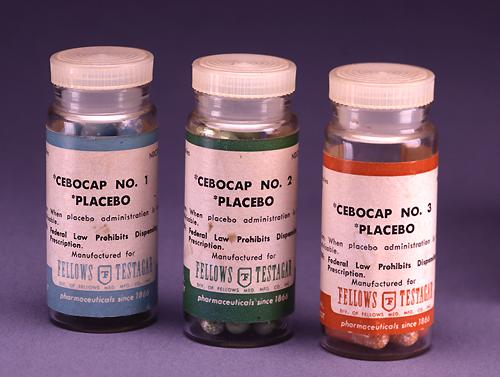And from the same people who bring us increasingly irreproducible results, a new article, published in Psychology Today, purports that the “Placebo Effect is Growing.” In the author’s words, “Over the last several years evidence has been accumulating that placebo effects are becoming more powerful. … differences in the magnitude of their [medications] impact relative to placebos are decreasing in size.” The placebo effect is real, but what this article offers is not.
That quote is confusing. As it turns out it isn’t that placebo is becoming stronger, for which no argument is offered, but that newer medications are less effective than older versions. Well, that is not entirely true, the author does cite the hypnotic levitation of a subject’s hand as the kind of expectation that fuels placebo’s growing power. [1] He goes on to suggest that the direct to consumer advertisement of pain medications may be heightening our placebo response by increasing our expectation of pain relief. Lyrica is the only pain medication in the top 10 most advertised drugs; used for fibromyalgia and neuropathic pain. And in those ads, Lyrica boasts more of improved patient mobility than pain relief.
But far and away the most salient part of the article is introducing us to Dr. Ted Kaptchuk, currently the director of Harvard’s Program in Placebo Studies. Dr. Kaptchuk, professor of medicine at Harvard, is an authority on Chinese Medicine having received his medical training at the Macao Institute of Chinese Medicine, and popularize and practice Chinese medicine in the United States. But “... over time, however, he became convinced that the quality the relationship he was able to cultivate with his patients, and their faith in his ability to be helpful to them played key roles in his success as a practitioner of Chinese medicine.”
I admit it; I am jealous. Dr. Kaptchuk parlayed a degree in Chinese Medicine into a full-time faculty position at Harvard and evidently a successful practice. But at some point, he was able to strip away the artifice of acupuncture, herbs and all those messy treatments that require evidence-based medicine and concentrate on what he and I agree is the healing power of medicine – the relationship of physician and patient.
The placebo effect is real, entangled in what people have called the art of medicine, but is genuinely medicine's soul, “ritual, symbols, meaning, empathy, hope, compassion, and trust.” Especially those last four, the basis of all relationships. Much of the “increased power” of placebos is found in diseases that have a strong affective component (and let me hasten to add that this does not diminish its physiologic basis or manifestations), conditions like depression and chronic pain. But rather than call it a placebo effect, let us call it by its real name, bedside manner. We don’t use that term so much anymore; it is difficult to standardize, quantify and incentivize. It also pulls back the veil on something that medicine finds hard to reconcile about itself; medicine is an applied art, p-values and predictive algorithms do not make it science.
Source: The Curious Case of the Growing Placebo Effect Psychology Today
[1] To be fair, placebo’s can alter our physiology. In one study saline was substituted for morphine resulting in 33% of patients afforded relief; when naloxone, a narcotic antagonist was infused in its place, the effect was lost suggesting that the placebo expectation of relief resulted in the release of endogenous painkillers.




